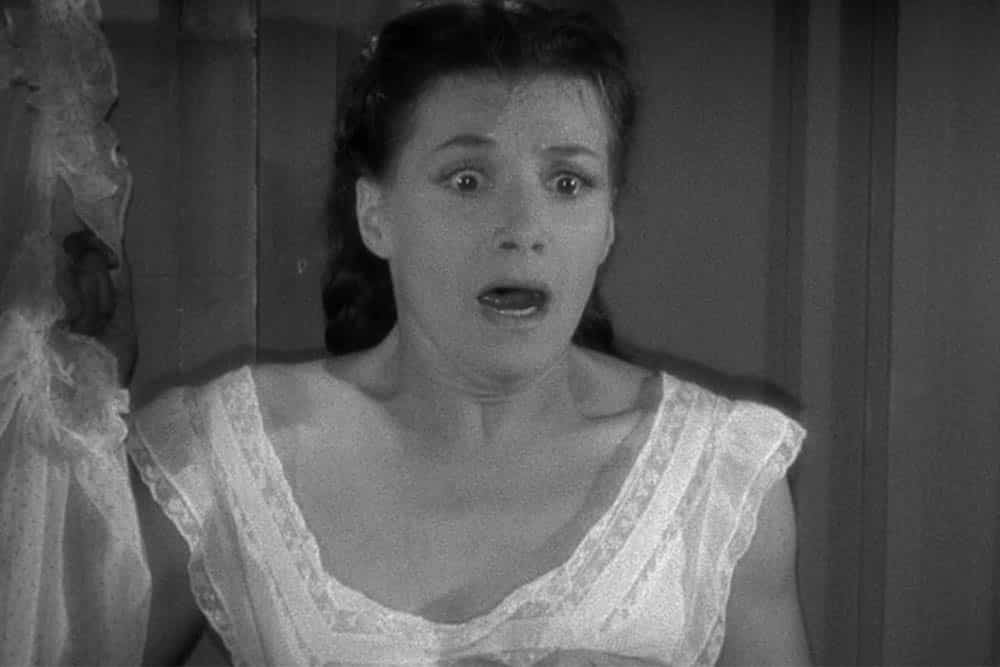
“My only regret is that he’ll never know I killed him.”
The director to whom Henri-Georges Clouzot is compared most often is Alfred Hitchcock. It’s an apt comparison, at least when talking about films like Clouzot’s 1955 murder-gone-ghostly thriller Diabolique. Based on a novel by Pierre Boileau and Thomas Narcejac – the same authors behind the novel that inspired Vertigo – it takes a domestic crime scenario and envelops it with the kind of cool, glassy dread that Hitchcock specialized in.
Where Clouzot outpaced Hitchcock, however, was in his skill at investing his characters, and not just his spaces, with such spring-loaded tension. Hitchcock’s men and women frequently seemed interchangeable, and the scenarios mattered (perhaps due to his greater productivity: 50-plus features next to Clouzot’s dozen or so). In Diabolique (released as The Devils in France), character and circumstance come together in a twisted concoction more sulfurous than anything Hitch could have crafted.
The Delasalle Boarding School is one of those grim old structures (once some nobleman’s manor) where the children of the rich get packed off for months of unenthusiastic instruction, sketchy and arbitrarily stern discipline, and even sketchier meals. Running the place is headmaster Michel Delasalle (Paul Meurisse), a cold-eyed bastard of a fellow who cares for his put-upon wife, Christina, even less than the students unfortunate enough to be left to his care.
Christina (the director’s wife, Vera Clouzot) is a sickly, quiet presence who seems to live only to be tormented by Michel. Given that he sees himself as the absolute master of this small realm, Michel thinks nothing of the fact that he’s openly carrying on an affair with one of the teachers. Although Nicole (Simone Signoret) suffers Michel’s advances and occasional beatings at night, she is also Christina’s friend.
This curious, dark triangle forms the primary dramatic intersection of Diabolique. The two women commiserate about Michel’s animalistic nature and near-constant put-downs (he refers to Christina as “a cute little ruin”), Christina fretting in a state of near nervous collapse, Nicole smoking stonily calm and regarding it all from behind her sunglasses with a certain tough Stockard Channing cool. Given the nature of paternalistic French divorce laws at the time and Michel’s legacy of punishment, by the time the film has begun, Christina and Nicole have already decided that the only way they can be set free is to murder the bastard.
The plan seems woefully misconstrued from the beginning, but Clouzot tracks it from a dispassionate distance, giving little clue to the twists and turns to follow. As the children bang around the school grounds in a pre-vacation frenzy, Christina and Nicole plot it out: the two of them stealing away in the dead of night, a phone call timed to get Michel running after her, the bottle of sedated whiskey, and finally the bathtub where he will be drowned and the shower curtain and luggage trunk they’ll use to dispose of him with.
Until that point, Clouzot shoots it all relatively straightforwardly, albeit with a dramatic use of a dark shadow that highlights the asymmetric nature of the characters’ tangled and triangulated passions. But with the murder itself, it’s a clipped and anti-climactic thing, done almost before it’s over. Of course, that’s when the story really begins.
Nicole and Christina’s plan goes off the tracks nearly immediately. Their first body disposal idea turns out to be a bust. At numerous points, they are almost caught (strangers trying to help at inappropriate times, lights suddenly and unexpectedly shining on them), and then the haunting begins. At this juncture, Diabolique takes a sharp turn for the gothic, all those shadowy fears only hinted at earlier in the film now coming to the fore.
As Christina’s panic over who or what is after the two of them increases, so does the tempo of Clouzot’s shooting. Shadows darken and lengthen, and angles become dramatically more acute. Whereas earlier Clouzot had been shooting his wife in an almost tender fashion, like some silent-film actress – in a helpful but perhaps over-the-top video introduction to the Criterion Collection DVD, producer Serge Bromberg notes the influence of silent-film techniques on Clouzot’s style – later she is lit from below in ghostly as though the frightened heroine in a ’30s Universal horror film. Who is the real ghost?
Fresh off his existential masterpiece The Wages of Fear from two years prior, Clouzot is working here with a much pulpier template, drawing from noir style, detective mystery plots, and monster movies. But lurking behind it all are some of the same concerns of that earlier (and arguably better) film, notably a proto-Catholic notion of original sin. No matter how much Christina is abused by Michel (there are hints of beatings and even rape in deserted corners of the school), she doesn’t seem to get past the notion that she is somehow to blame. Nicole might be the amoral machinist of the murder. Still, that attitude seems to come less from a deliberate amorality than from a conscious belief that she has fallen from grace and will never be able to reattain it.
None of this weighs down the narrative, though. Diabolique clicks along just perfectly. An original trailer included on the Criterion set has a playfully devilish cast to it (again, much like Hitchcock, as many of the set’s extras make a point of noting). A note at the end of the film itself implores the audience “Don’t be devils!” by ruining the surprise ending for other viewers. This is a film meant to entertain, albeit with a certain spiritual shiver.


![Call for Papers: All Things Reconsidered [MUSIC] May-August 2024](https://www.popmatters.com/wp-content/uploads/2024/04/all-things-reconsidered-call-music-may-2024-720x380.jpg)



